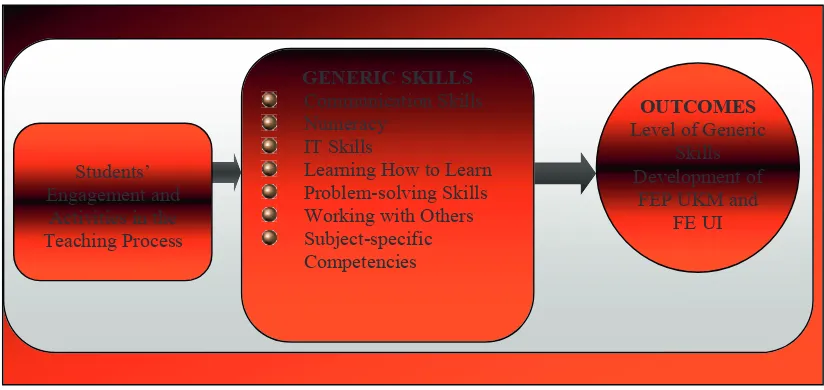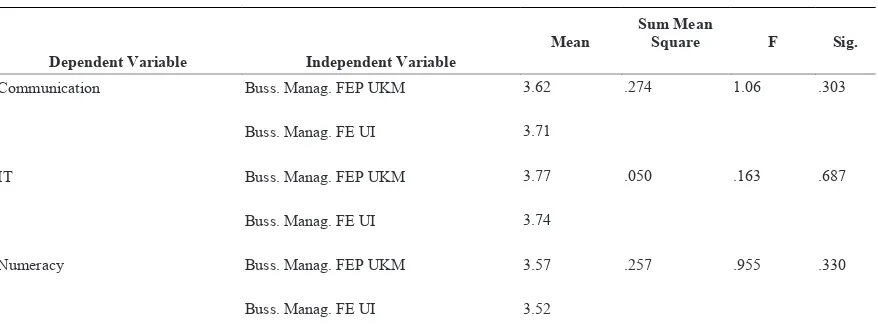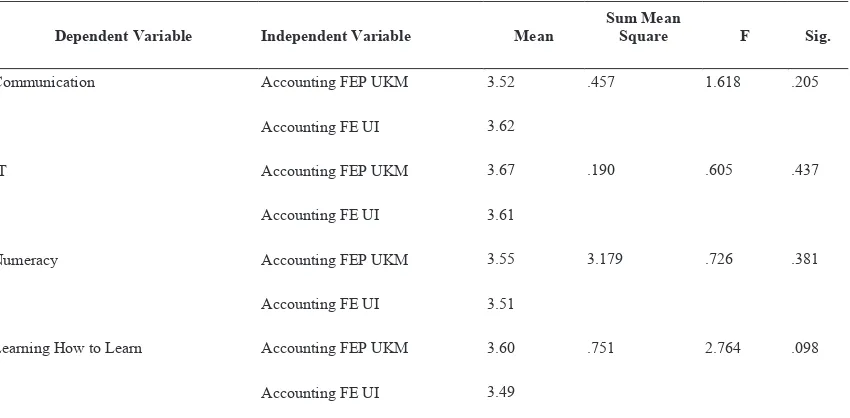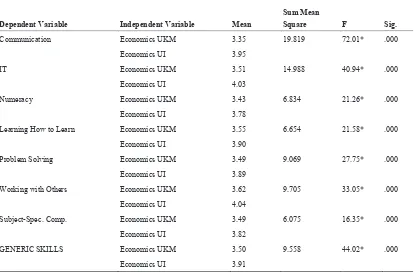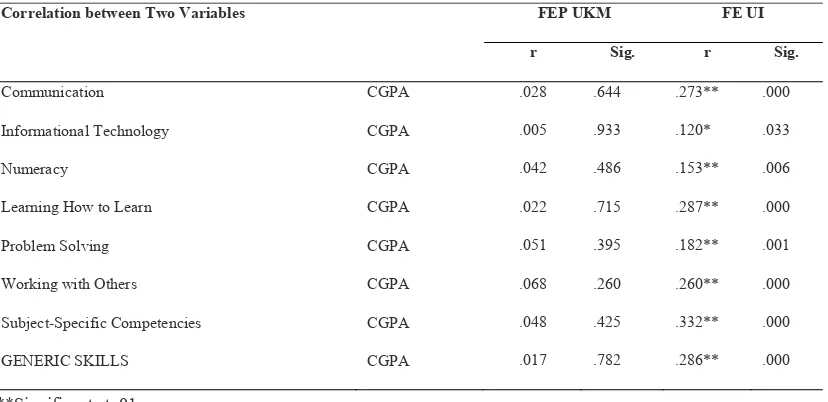Procedia - Social and Behavioral Sciences 83 ( 2013 ) 71 – 82
1877-0428 © 2013 The Authors. Published by Elsevier Ltd. Open access under CC BY-NC-ND license.
Selection and/or peer-review under responsibility of Prof. Dr. Hafize Keser Ankara University, Turkey doi: 10.1016/j.sbspro.2013.06.015
2
ndWorld Conference on Educational Technology Researches – WCETR2012
Students’ generic skills at the National University of Malaysia and
the National University of Indonesia
Hadiyanto
a *, Mohammed Sani Bin Ibrahim
baTeaching Staff at the Faculty of Education and Teacher Training, University of Jambi (UNJA), Jambi 36361 Indonesia bTeaching Staff at the Faculty of Education, University of Malaya (UM), Kuala Lumpur 50603 Malaysia Abstract
This study examined the students’ generic skills (communication, IT, numeracy, learning how to learn, problem solving, working with others, and subject-specific competencies) at the National University of Malaysia (UKM) and the National University of Indonesia (UI). Students’ self-reports demonstrated that UI students rated their generic skills higher than UKM students, and that among business management students, those at UKM rated their skills higher than those at UI, while in the economics department, UI students gave higher scores than UKM students. Multiple regression analysis showed that subject-specific competencies, learning how to learn, and numeracy were significantly associated with UI students’ academic achievement.
Selection and peer review under responsibility of Prof. Dr. Hafize Keser.
Keywords: Generic skills, development, practice, university, higher education
1.Introduction
A number of studies such as Pumphrey and Slater (2002), Curry et al. (2003), Borthwick and Wissler (2003), Crebert et al. (2004), Bath et al. (2004), the Business Council of Australia (BCA, 2006), and Jones (2009) have revealed that employers are not satisfied with the employability (or ‘generic’) skills possessed by undergraduate students, reporting that students are not sufficiently provided with generic skills during university education. Most studies suggest that the development of generic skills is best facilitated by giving students opportunities for practical application, rather than simply talking about or demonstrating what to do. The preferred teaching approach is no longer the lecture or the slide presentation, where the lecturer simply stands in front of the class, showing slide after slide. In today’s university, teaching and learning is student centred, in that students can build their generic skills through various classroom activities.
Similar issues regarding higher education have arisen and been discussed widely in Malaysia and Indonesia. The study conducted by Jelas et al. (2006) showed that students’ overall generic skills were at average levels (2–11). Students also perceived that their communication, IT, numeracy, learning how to learn, problem solving, working with others, and discipline-based skills, as developed at university, were at an average level. The results of employers’ interviews conducted in Malaysia further show that there is a consistent and shared belief that the graduates should have these seven core skills. Similarly, Ambigapathy and Aniswal (2005) report that comments © 2013 The Authors. Published by Elsevier Ltd. Open access under CC BY-NC-ND license.
Students’
from graduates and employers emphasized the importance of generic skills, particularly teamwork, in the curriculum.
In Indonesia, Irma (2007) shows that employers ranked communication skills as the most important for the graduate employee, followed by integrity and honesty, working in a group, interpersonal skills, ethical values, good motivation, organizational skills, IT skills, and a high Cumulative Grade Point Average (CGPA).
These issues have inspired the higher education authorities of Malaysia and Indonesia to help undergraduate students to develop generic skills during their study at university. The education process should emphasize the importance of enhancing students’ generic skills, that is, communication, IT, numeracy, problem solving, learning how to learn, working with others, and subject-specific competencies. These skills should be integrated into the methodology of teaching and learning, in order to produce graduates with a high self-learning capacity, as the Basic Framework for Higher Education Development, the Malaysian Qualification Framework (2005), and UNESCO (2007) indicate.
Although extensive research has been carried out in many countries, few studies examine the situation across national borders, and therefore the present study has been conducted at both the National University of Malaysia (UKM) and the National University of Indonesia (UI). It is expected that this study will identify positive actions that can be used to improve the quality of graduates at both universities.
2.Conceptual Framework
The conceptual framework for this study (Figure 1) has been developed to illustrate the data resources, the research process, and the type of data collected to attain the research objective, as described below.
Figure 1. Conceptual framework of the study (adapted from Jelas et al., 2006; Bennett et al., 2000; LTSN, 2002; Qualifications and Curriculum Authority (QCA), 2000; and Washer, 2007)
considered to consist of seven skills: communication, numeracy, IT, learning how to learn, problem solving, working with others, and subject-specific competencies (see Jelas and Azman, 2005; Bennett et al., 2000; Cornford, 1999). The seven generic skills as displayed in the conceptual framework are briefly elaborated in the sections belo
2.1.Communication skills
Communication skills are necessary to enable graduates to deliver their ideas as individuals and group members. As Morreale et al. (2000) indicate, these skills combine a diversity of elements in order to produce good decisions, solutions, and negotiations (1–3). Communication skills refer to one’s ability to use active listening, writing skills, oral communication, presentation skills, and questioning and feedback skills to establish successful communication (Mayer Committee, 1992, as cited by the Scottish Qualification Authority, 2003; Bennett, 2000; Washer, 2007; Jones, 2009).
2.2.Numeracy
Numeracy is defined as the aggregate of skills, knowledge, beliefs, patterns of thinking, and related communicative and problem solving processes that individuals need to effectively interpret and handle real-world quantitative situations and problems (Gal I, 1997; Jelas et al., 2006, Washer, 2007).
2.3.Information Technology
IT skills refers to the ability of ‘individuals to apply technology such as computers, software applications, databases, and other technologies to achieve a wide variety of academic, work-related, and personal goals (Mayer Committee, 1992, as cited by the Scottish Qualification Authority, 2003; ACRL, 2004; Washer, 2007). Harrington and Elander (2003) refer to the use of technology in teaching and learning to provide manifold opportunities for teachers and learners to develop their lifelong learning.Jones, 2009).
2.4.Learning How to learn
Learning how to learn is defined as acquiring the set of skills and knowledge required to learn efficiently and effectively in any learning situation (QCA, 2000). Learning demands processes, understandings, and skills that can be learned and taught. When one has gained mastery in learning how to learn, one can learn effectively and efficiently at any age. Thus, this competence is considered of potential importance to the concept of lifelong learning and the self-managed learner (Smith, 1982; Jelas et al., 2006; Washer, 2007).
2.5.Problem Solving Skills
Problem solving skills constitute the ability to tackle problems systematically, for the purpose of working towards solutions and learning from this process (Jelas et al., 2006; Washer, 2007). The ability to solve problems will have a great impact on the success of the students’ ‘real life’ endeavours (Cook and Slife, 1985). QCA (2000) explains the purpose of these skills as to enable students to tackle problems systematically in the workplace, working towards appropriate solutions and learning from this process.
2.6.Working with Others
become valuable members of a team is one of the most vital skills for employability (Mayer Committee, 1992; QCA, 2000). The ability to work as a team member will have a great impact on the student’s ability to produce new ideas and deal with any situation in real-life work.
2.7.Working with Others
Subject-specific competencies are defined as the knowledge, capabilities, and dispositions required to organize and provide information at the appropriate level of the study relating to the subject content taught (Jelas et al., 2006; Washer, 2007). This means that every graduate must have specific subject knowledge related to his/her selected discipline, and must understand both how to link this information to other disciplines and how it can be applied in a real-world setting.
2.8.Evaluation of Generic Skills
The practice and development of generic skills were evaluated using the self-reports provided by the students. These reports described the ways that students’ engaged and carried out activities in the process of learning in order to acquire generic skills. The level of generic skills identified were compared and analysed. As the final part of the conceptual framework shows, the outcomes of the study include the development of students’ generic skills at both universities.
3
3 . RR e s e a rc h O b je c tiv e s
The purpose of this study was to compare the practice of generic skills among undergraduate students in the Economics Faculty at the National University of Malaysia (FEP UKM) and the Economics Faculty at the National University of Indonesia (FE UI). The main areas of focus of the study were to (1) investigate and compare the level of generic skills practised by undergraduate students in FEP UKM and FE UI, according to self-reports; (2) investigate the differences and similarities in the generic skills practiced by these students; (3) investigate the differences and the similarities of generic skills practiced by undergraduate students across different departments in FEP UKM and FE UI; and (4) to investigate the correlation and relationship between generic skills and students’ academic achievements in FEP UKM and FE UI.
4
4 . RR e s e a rc h M e th o d
Table 1. Generic skills score rating
Students’ Questionnaire (5-point Likert Scale) 1. Never 2. Rarely 3. Sometimes 4. Often
5. Very Often
Table 2. Interpretations of mean scores
As Table 3 shows, a mean score between 1.00 and 2.33 indicates a low level of generic skills, a mean score between 2.34 and 3.66 a medium level, and a mean score between 3.67 and 5.00 a high level of generic skills.
4.1.Reliability and validity of Instruments
A reliability analysis demonstrated that all constructs of generic skills included in the study had a high Cronbach alpha coefficient (>0.7) and corrected-item correlation (>.300). This analysis shows that there is a consistency of instruments between the study conducted by Jelas et al. (2006) and this study. Leave one line space between the heading and the table. Only horizontal lines should be used within a table, to distinguish the column headings from the body of the table. Tables must be embedded into the text and not supplied separately.
Factor analysis was also conducted to confirm that the items in each construct yielded strong factor loading upon the construct itself. The results show that communication competencies yielded factor loading in the range .628 to .716, IT skills in the range .624 to .731, numeracy in the range .612 to .724, learning how to learn in the range .522 to .719, problem solving in the range .482 to .707, working with others in the range .596 to .657, and subject-specific competencies in the range .658 to .773. These findings confirm that the items in each construct explain and measure according to their intended purpose.
5.Research Findings
The data collected were analysed using the Statistical Package for Social Sciences (SPSS) MS-Window version 15. Descriptive statistics were used to portray and compare students’ generic skills development between FEP UKM and FE UI. Inferential statistics were used to enable the researcher to decide whether there were differences between the groups of respondents as well as to investigate whether there was any relationship between students’ CGPA and their generics skills. The inferential statistics used in this study include MANOVA, Pearson correlation, and multiple regression. The findings regarding the students’ practice of generic skills in the FEP UKM and the FE UI are reported below.
5.1.Levels of Students’ generic skills in FEP UKM and FE UI
According to the findings, the students in FE UI showed a higher performance in generic skills than those in FEP UKM. Undergraduate students in FE UI obtained a higher mean score for generic skills (3.67) than those in FEP UKM (3.60). A closer examination of the ratings given to generic skills found that undergraduate students in FE UI
Mean Score Interpretation1.00 to 2.33 Low
2.34 to 3.66 Medium
gave a higher mean score for communication, IT, numeracy, learning how to learn, problem solving, and working with others than students in FEP UKM (see Table 3).
Table 3. Comparison of mean, standard deviation, and level of generic skills between FEP UKM and FE UI
Generic Skills UKM UI
Mean S.D. Level Mean S.D. Level
Communication 3.48 .526 Medium 3.73 .557 High
Information Technology 3.59 .747 Medium 3.82 .879 High
Numeracy 3.50 .548 Medium 3.50 .597 Medium
Learning How to Learn 3.61 .513 Medium 3.64 .574 Medium
Problem Solving 3.62 .558 Medium 3.66 .573 Medium
Working with Others 3.69 .505 High 3.82 .565 High
Subject-Specific Competencies 3.58 .552 Medium 3.59 .594 Medium
Overall Generic Skills 3.60 .440 Medium 3.67 .453 High
5.2.The differences and the similarities of generic skills practised by undergraduate students across the department at FEP UKM and FE UI
The MANOVA test revealed that business management students in FEP UKM rated learning how to learn (F = 5.288 and sig. = .022 < .05), problem solving (F = 4.358 and sig. = .038 < .05), subject-specific competencies (F = 6.159 and sig. = .014 < .05), and overall generic skills (F = .118 and sig. = .011 < .05) more highly than business management students in FE UI. However, there was no significant difference in ratings of generic skills between business management students in FEP UKM and FE UI in terms of communication (F = 1.064 and sig. = .303 > .05), IT (F = .163 and sig. = .687 > .05), numeracy (F = .955 and sig. = .330 >.05), or working with others (F = .463 and sig. = .497 > .05). The findings are displayed in Table 4.
Table 4. The different ratings of generic skills between business management students at UKM and UI
Dependent Variable Independent Variable
Mean
Sum Mean
Square F Sig.
Communication Buss. Manag. FEP UKM 3.62 .274 1.06 .303
Buss. Manag. FE UI 3.71
IT Buss. Manag. FEP UKM 3.77 .050 .163 .687
Buss. Manag. FE UI 3.74
Numeracy Buss. Manag. FEP UKM 3.57 .257 .955 .330
* The mean difference is significant at the .05 level.
The comparison of generic skills between students of accounting in FEP UKM and FE UI, as displayed in Table 5, found that there is no significant difference between the two groups in communication (F = 1.618 and sig. = .205 > .05), IT (F = .605 and sig. = .437 > .05), numeracy (F = .726 and sig. = .381 > .05), learning how to learn (F = 2.764 and sig. = .098 > .05), problem solving (F = 2.228 and sig. = .137 > .05), working with others (F = .027 and sig. = .869 > .05), subject-specific competencies (F = 2.217 and sig. = .138 > .05), and overall generic skills (F = 2.289 and sig. = .132 > .05).
Table 5. The different ratings ofgeneric skills between accounting students at UKM and UI
Dependent Variable Independent Variable Mean
Sum Mean
Square F Sig.
Communication Accounting FEP UKM 3.52 .457 1.618 .205
Accounting FE UI 3.62
IT Accounting FEP UKM 3.67 .190 .605 .437
Accounting FE UI 3.61
Numeracy Accounting FEP UKM 3.55 3.179 .726 .381
Accounting FE UI 3.51
Learning How to Learn Accounting FEP UKM 3.60 .751 2.764 .098
Accounting FE UI 3.49
Learning how to learn Buss. Manag. FEP UKM 3.73 1.220 5.28* .022
Buss. Manag. FE UI 3.60
Problem solving Buss. Manag. FEP UKM 3.75 1.041 4.35* .038
Buss. Manag. FE UI 3.63
Working with others Buss. Manag. FEP UKM 3.80 .108 .463 .497
Buss. Manag. FE UI 3.76
Subject-spec. comp. Buss. Manag. FEP UKM 3.72 1.442 6.15* .014
Buss. Manag. FE UI 3.58
Overall generic skills Buss. Manag. FEP UKM 3.71 2.461 .118* .011
Problem Solving Accounting FEP UKM 3.64 .603 2.228 .137
Accounting FE UI 3.53
Working with Others Accounting FEP UKM 3.69 .008 .027 .869
Accounting FE UI 3.68
Subject-Spec. Comp. Accounting FEP UKM 3.54 .709 2.217 .138
Accounting FE UI 3.43
CORE Accounting FEP UKM 3.61 .417 2.289 .132
Overall Generic Skills Accounting FE UI 3.52
* The mean difference is significant at the .05 level.
However, the analysis of differences revealed that students of economics in FE UI gave higher ratings for communication (F = 72.016 and sig. = .000 < .05), IT (F = 40.940 and sig. = .000 < .05), numeracy (F = 21.263 and sig. = .000 < .05), learning how to learn (F = 21.589 and sig. = .000 < .05), problem solving (F = 21.589 and sig. = .000 < .05), working with others (F = 33.050 and sig. = .000 < .05), subject-specific competencies (F = 16.356 and sig. = .000 < .05), and overall generic skills (F = 44.023 and sig. = .000 < .05) than students of economics in FEP UKM (see Table 6).
Table 6. The different ratings of generic skills between economics students at UKM and UI
Dependent Variable Independent Variable Mean
Sum Mean
Square F Sig.
Communication Economics UKM 3.35 19.819 72.01* .000
Economics UI 3.95
IT Economics UKM 3.51 14.988 40.94* .000
Economics UI 4.03
Numeracy Economics UKM 3.43 6.834 21.26* .000
Economics UI 3.78
Learning How to Learn Economics UKM 3.55 6.654 21.58* .000
Economics UI 3.90
Problem Solving Economics UKM 3.49 9.069 27.75* .000
Economics UI 3.89
Working with Others Economics UKM 3.62 9.705 33.05* .000
Economics UI 4.04
Subject-Spec. Comp. Economics UKM 3.49 6.075 16.35* .000
Economics UI 3.82
GENERIC SKILLS Economics UKM 3.50 9.558 44.02* .000
* The mean difference is significant at the .05 level.
5.3.The correlation and relationship between students’ academic achievement and their generic skills in FEP UKM
and FE UI
Pearson’s correlation was used to analyse the strength of the relationship between generic skills and students’ CGPA in FEP UKM and FE UI. As the findings in Table 7 show, there was no significant correlation between students’ CGPA and communication (r = .028, sig. = .644 > .05), IT (r = .005, sig. = .933 > .05), numeracy (r = -.042, sig. = .486 > .05), learning how to learn (r = .022, sig. = .715 > .05), problem solving (r = .051, sig. = .395 > .05), working with others (r = -.068, sig. = .260 > .05), subject-specific competencies (r = -.048, sig. = .425 > .05), or overall generic skills (r = -.017, sig. = .782 > .05) at FEP UKM. At FE UI, however, there was a significance correlation between CGPA and communication (r = .273, sig. = .000 < .05), IT (r = .120, sig. = .033 < .05), numeracy (r = .153, sig. = .006 < .05), learning how to learn (r = .287, sig. = .000 < .05), problem solving (r = .182, sig. = .001 < .05), working with others (r = .260, sig. = .000 < .05), subject-specific competencies (r = .332, sig. = .000 < .05), and overall generic skills (r = .286, sig. = .000 < .05).
Table 7. Pearson’s correlation of between generic skills and students’ CGPA at UKM and UI
Correlation between Two Variables FEP UKM FE UI
r Sig. r Sig.
Communication CGPA .028 .644 .273** .000
Informational Technology CGPA .005 .933 .120* .033
Numeracy CGPA .042 .486 .153** .006
Learning How to Learn CGPA .022 .715 .287** .000
Problem Solving CGPA .051 .395 .182** .001
Working with Others CGPA .068 .260 .260** .000
Subject-Specific Competencies CGPA .048 .425 .332** .000
GENERIC SKILLS CGPA .017 .782 .286** .000
**Significant at .01 *Significant at .05
students’ CGPA. This means that if the learning how to learn score increases by one unit, then the students’ CGPA should increase by .154 units. The third predictor was numeracy, which yielded ß = .154, t = 2.21, with a significance of p = .028 < 0.05, contributing 1.3% to students’ CGPA. This means that if the numeracy score increases by one unit, then the students’ CGPA should increase by .154 units (see Table 8).
Table 8. Multiple regression analysis of subject-specific competencies, learning how to learn, and numeracy, toward students’ CGPA in FE UI
Predictor B
The results presented in this study shed light on the differences and similarities between students’ generic skills in FEP UKM and FE UI.In general, the quantitative data indicated that both groups (FE UI and FEP UKM) were able to distinguish clearly between the seven components of the generic skill-set (communication, IT, numeracy, problem solving, learning how to learn, working with others, and subject-specific competencies). They were able to reflect on their own level of generic skills, and to identify which of the seven skills they practice.
Although FE UI students demonstrated a higher rating for generic skills compared to those at FEP UKM, both faculties need to encourage the development of communication, IT, numeracy, learning how to learn, problem solving, working with others, subject-specific competencies, and overall generic skills of their students. It is expected that graduates will be able to comprehend and analyse work situations with a critical mind and use their generic skills to succeed in their career, satisfy their employer, and contributes to their country. It is particularly important, due to the lack of communication skills practice among undergraduate students, that FEP UKM should encourage lecturers to implement learning activities that aim to improve students’ communication skills to ensure a minimum mean score of 3.67 to 4, that is, the lowest part of the ‘high level’ banding of generic skills, according Bennett et al.’s (2000) interpretation of mean scores.
become aware of the skills needed by students to compete in the job market after graduating.
Another common issue in higher education is the relationship between students’ generic skills and their CGPA (BCA, 2006; Ellis et al., 2005). Unfortunately, this study demonstrated that generic skills have no relationship with students’ CPGA in FEP UKM. This result implies that generic skills are not embedded into any kind of grading systems at FEP UKM. At FE UI, meanwhile, students’ generic skills made a small positive contribution to their CGPA, indicating that generic skills are incorporated into the grading systems at FE UI.
The findings of this study raise an important issue for universities and other institutions. It is expected that both UKM and UI provide students with generic skills during their university education. The limited generics skills revealed by this study are therefore of concern. Specifically, our study questions the assumption that generic skills are an inevitable outcome of time spent studying at university, and as discussed, this raises an issue that has received considerable attention both within and beyond HE institutions. Lecturers should make the connections between the various parts of the teaching syllabus more explicit, in order to forge stronger links between knowledge content and generic skills. At the same time, the promotion of generic skills should be highlighted as one of the strengths of graduate training at university.
Graduates should leave higher education better and stronger than as they entered it, and this improvement should be attributable to the undergraduate curriculum, rather than simply to the fact that three to five years have passed. Graduates need to be equipped with generic skills that they can use to ‘sell themselves’ to employers. By practising these generic skills in and outside of the classroom will enable students to become more effective, independent learners during their studies, and will enhance their employment prospects following graduation. As a result, the university graduate should leave with three main attributes, namely employability, life-long learning, and good citizenship (QCA, 2000; Jelas et al., 2006; Washer, 2007; Star and Hammer, 2007). In short, this study contributes to the issues surrounding the development of generic skills at university, and its results may be used to inform, support, and plan innovations within the university curriculum and teaching at both universities.
7.Conclusion
This study was conducted at the National University of Malaysia (UKM) and the National University of Indonesia (UI), in order to identify the level of generic skills being developed through the courses at each university, particularly those offered in the second and third year of the BEd (Hons) undergraduate programme, as well as to monitor students’ general awareness of and engagement in these skills. The study concludes that there is a different but similar trend in students’ generic skills practiced at the National University of Malaysia and the National University of Indonesia. However, the students’ practice of generic skills was not strongly emphasized at either university. The authorities of the universities should consider the manner in which students’ generic skills can be assessed, and whether to make a certain level of generic skills level a requirement of completing a degree programme within their institution.
R
R e fe re n c e s
ACRL. Information literacy competency standards for higher education. American Library Association; 2004. Online: http://www.ala.org/acrl/ilcomstan.html. 23 March, 2009.
Ambigapathy P, Aniswal AG, editors. University curriculum: An evaluation on preparing graduates for employment. Higher Education Research Monograph 6. Pulau Pinang: National Higher Education Research Institute; 2005. Online: http://www.usm.my/ipptn/fileup/University20Curriculum1.pdf. July 18, 2008.
Bath D, Smith C, Stein S, Swann R. Beyond mapping and embedding graduate attributes: Bringing together quality assurance and action learning to create a validated and living curriculum. HERD 2004; 23(3):313–28.
Bennett N, Dunne E, Carre C. Skills development in higher education and employment. Buckingham: SRHE & Open University Press; 2000. Business Council of Australia (BCA). New concepts in innovation: The keys to a growing Australia. Melbourne: BCA; 2006.
Borthwick, J. Wissler, R. Postgraduate research students and generic capabilities: Online directions. Canberra: Department of Education, Science and Training Research Evaluation Programme; 2003.
Cornford IR. Imperatives in teaching for lifelong learning: Moving beyond rhetoric to effective educational practice. Asia-Pacific Journal of Teacher Education 1999; 27(2):23–35.
Crebert G, Bates M, Patrict C, Cragnolini V. Developing generic skills at university, during work placement and in employment: Graduate’s perceptions. HERD 2004; 23(2):148–64.
Curry P, Sherry R, Tunney O. What transferable skills should students develop during their time in college: Results of Modern Languages Students Survey. Trinity College, Dublin; 2003. This project is directed by the Steering Committee.
Basic framework for higher education development KPPTJP IV. Directorate General of Higher Education Indonesia; 2003-2010. Online http://www.dikti.go.id/Archive2007/KPPTJP_2003_2010.pdf. December 7, 2007.
Ellis PJA, Bell SB, Ployhart EP, Hollenbeck RJ, Ilgen RD. An evaluation of generic teamwork skills training with action teams: Effects on cognitive and skill-based outcomes. Cornell University; 2005. Online: http://digitalcommons.ilr.cornell.edu/articles/46. December 20, 2007. Gal I. Big picture: What does ‘numeracy’ mean? GED Items 1997; 12(4/5): Also available online through Testing Service of the American
Council on Education: http://mathforum.org/teachers/adult.ed/articles/gal.html. January 21, 2007.
Harrington K, Elander J. Using assessment criteria to support student learning. Investigations in University Teaching and Learning 2003; 1(1):63–6.
Irma D. Soft skill? Pikiran Rakyat, Thursday, June 17, 2007. Newspaper; 2007.
Jelas ZM, Azman N. Generic skills provision in higher education: A Malaysian perspective. The International Journal of Learning 2005; 12(5):200–10.
Jelas ZM, Azman N, Ali MM, Nordin NM, Tamuri AH. Developing generic skills at graduates: A study of effective higher education practices in Malaysian universities; Summary report. Kuala Lumpur: Universiti Kebangsaan Malaysia, Faculty of Education; 2006.
Jones A. Redisciplining generic attributes: The disciplinary context in focus. J Stud High Educ 2009; 34(1):85–100.
LTSN. Resource guide: The development of key skills in higher education. London: LTSN Hospitality, Leisure, Sport and Tourism; 2002. Malaysian Qualification Framework (MQF). Guidelines on standards of the bachelor degree level. Volume 1. Kementerian Pendidikan Malaysia;
2005. Online: http://www.mqa.gov.my/portal2012/dokumen/MALAYSIAN%20QUALIFICATIONS%20FRAMEWORK_2011.pdf. February 21, 2007.
Mayer Committee. Key competencies: Report of the committee to advise the Australian Education Council and Ministers of Vocational Education, Employment and Training on employment-related key competencies for post compulsory education and training. Melbourne; 1992. Online: https://isbndb.com/d/book/key_competencies_a01.html. November 9, 2007.
Morreale SP, Osborn MM, Pearson, JC. Why communication is important: a rationale for the centrality of a discipline; 2000. Online: http://www.natcom.org/nca/files/ccLibraryFiles/FILENAME/000000000158/WhyCommisImportant.pdf. September 8, 2007.
Pumphrey J, Slater, J. An assessment of generic skills needs. Skills Dialogues ReportNo. 13. Nottingham: Dfes; 2002. Qualifications and Curriculum Authority. Key skills units (Levels 1-5).London: QCA; 2000.
Scottish Qualifications Authority. Key competencies: some international comparisons: Policy and Research. Research Bulletin, 2; 2003. Online: http://www.sqa.org.uk/files_ccc/Key_Competencies.pdf. August 29, 2009.
Smith R. M. Learning how to learn: applied theory for adults. Milton Keynes: Open University Press; 1982.
Star C, Hammer S. Teaching generic skills: eroding the higher purpose of universities, or an opportunity for renewal? Oxford Review of Education 2007; 34(2):237–51.
UNESCO. Higher education in south-east ASIA. Thailand. 2006. Online: http://unesdoc.unesco.org/images/0014/001465/146541e.pdf. November 14, 2007.
